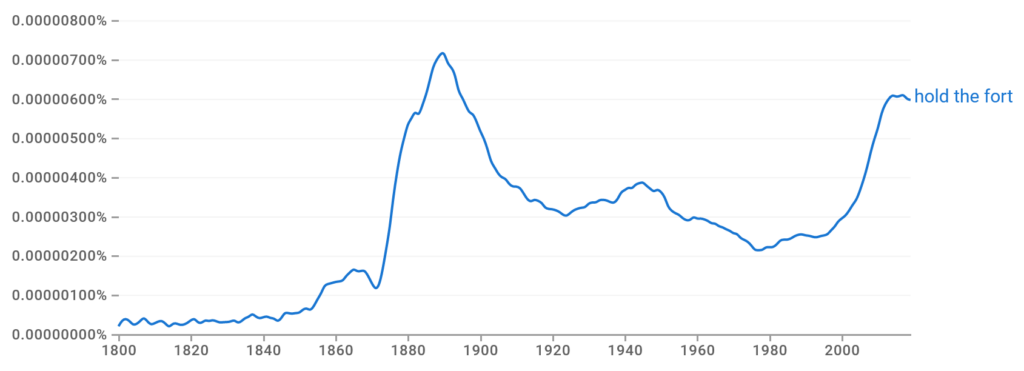Hold down the fort or hold the fort is an idiom typically used to mean managing or maintaining control of a situation, place, or responsibility while someone is temporarily absent. The idiom originates from military language, where soldiers held a fort or defensive position when others were absent.
Idioms are expressions with figurative meanings, often unique to a language or region, adding richness and cultural nuances to communication. Learning idioms can help you master the nuances of the English language and give your prose more sparkle.
This article explores this expression’s meaning, origin, synonyms, and various ways to use it. Keep reading and test what you learn by taking our fun quiz at the end.

What Does the Idiom Hold Down the Fort Mean?
The idiom hold down the fort means to temporarily take charge of a situation or workplace while the boss is away, keeping everything running smoothly in their absence. In a broader context, it is commonly used in everyday language to convey the idea of maintaining stability or order in various situations.
For example, if you’re left to manage the department while your manager is away at a meeting, you can be said to be left holding the fort for your boss.
Here’s how other major online dictionaries define the idiom hold down the fort:
- Collins Dictionary: “If you hold the fort for someone, or, in American English, if you hold down the fort, you look after things for them while they are somewhere else or are busy doing something else.”
- Merriam-Webster: “To be in charge of a place while the person who is usually in charge is away.”
- Cambridge Dictionary: “To have responsibility for something while someone is absent.”
Literal Meaning vs. Figurative Meaning
The literal meaning of hold down the fort is to physically defend and hold down a military stronghold or fort in the face of an enemy attack.
When used figuratively, holding down the fort means managing or maintaining a situation in someone’s absence by maintaining the status quo and controlling things.
Variations of the Idiom
The following are variations of the idiom hold down the fort:
- Hold the fort
- Watch the fort
- Guard the fort
How Is Hold Down the Fort Commonly Used in Context?
Hold down the fort is an informal expression most commonly used in conversational settings and informal writing. Use the idiom casually in conversation to have the most impact with its use.
Now, let’s further dissect its practical applications, offering insights into the diverse ways individuals employ this idiom. The following sections will illuminate the spectrum of its usage, provide practical tips for effective application, and guide you on where to find real-world examples that bring this expression to life.
What Are the Different Ways to Use Hold Down the Fort?
- Literal military context: “Hold down the fort until the reinforcements arrive.”
- Everyday use: “Would you mind holding down the fort here for me while we’re away over the weekend?”
- Office or workplace: “I need you to hold down the fort for me while I’m attending a meeting with HR.”
- Family matters: “I have to go to the store. Please hold down the fort and make sure your brother does his homework before he goes out with his friends.”
- In an emergency: “Please hold down the fort and stop the traffic while I call the emergency services.”
Where Can You Find Examples of Hold Down the Fort?
Hold down the fort is typically used to express managing a situation while waiting for someone else to take over or return after an absence. You’ll find it used in literature, movies and TV shows, songs, conversations, personal anecdotes, and online resources.
Here are some examples of it being used in online publications:
Welcome back to Nellie and Daniel Davies, who attended Nellie’s eldest son’s wedding in the Philippines – leaving Mike at home to hold the fort. (The South Coast Herald)
Pearl Jam stepped back into the spotlight after an eight-year hiatus with their upcoming studio album, Gigaton, which’ll take them all over Canada and the US this spring for the accompanying tour, while the South Korean juggernauts will take over the earlier part of the summer for their 17-date North American jaunt and McGraw will hold down the fort for the latter part of summer into September for his Here On Earth Tour. (Billboard Magazine)
“Obviously, we try to hold down the fort until those guys get back.” (Toronto Sun)
What Are Some Tips for Using Hold Down the Fort Effectively?
Here are tips for effectively using the idiom hold down the fort::
- Context matters: Consider the situation. Is it a formal or informal setting? Adjust your use of the phrase accordingly to ensure appropriateness.
- Clarity is key: Be clear in your communication. Ensure the message of maintaining control or responsibility during someone’s absence is evident.
- Appropriate tone: Gauge the tone of the conversation. While the phrase is generally casual, be mindful of the context to strike the right balance.
- Know your audience: Understand your audience to tailor the usage. Different environments may require different levels of formality or informality.
- Avoid overuse: Like any expression, moderation is key. Reserve the use of this idiom for situations where it genuinely conveys the intended meaning.
What Is the Origin of the Idiom Hold Down the Fort?

The idiom hold the fort finds its roots in military usage, specifically originating from an order issued by General William Tecumseh Sherman in 1864. During the Civil War, Sherman’s command, “Hold the fort [against the enemy at Allatoona] at all costs, for I am coming,” became a notable expression.
This directive emphasized the critical task of maintaining control over a fortification in the absence of the main force, illustrating the phrase’s origin.
How Did the Idiom Evolve Over Time?
Over time, this military command became integrated into everyday language, evolving into the more colloquial form hold down the fort. Today, it is commonly used to convey the responsibility of maintaining stability or control in various situations beyond military contexts.
What Are Some Related Terms to Hold Down the Fort?
Several related terms and expressions convey similar sentiments to hold down the fort in different contexts. Here are some related terms and phrases:

Synonyms
- Preserve the status quo
- Stand firm
- Hold the line
- Keep things going
- Mind the shop
- Keep the ship steady
- Keep the home fires burning
Antonyms
- Abandon ship
- Surrender the position
- Desert the post
- Evacuate the area
- Relinquish control
Hold (Down) the Fort: Test Your Knowledge!
Choose the correct answer.
Let’s Review
Hold down the fort is a vivid idiom originating from military roots, symbolizing the act of maintaining control during someone’s absence. Idioms, rich in figurative language, enhance communication by capturing cultural nuances.
This exploration of the expression’s meaning, origin, synonyms, and usage provides a comprehensive understanding. Immerse yourself in the intricacies of language and solidify your grasp of idiomatic expressions.
Check out some others we covered:
